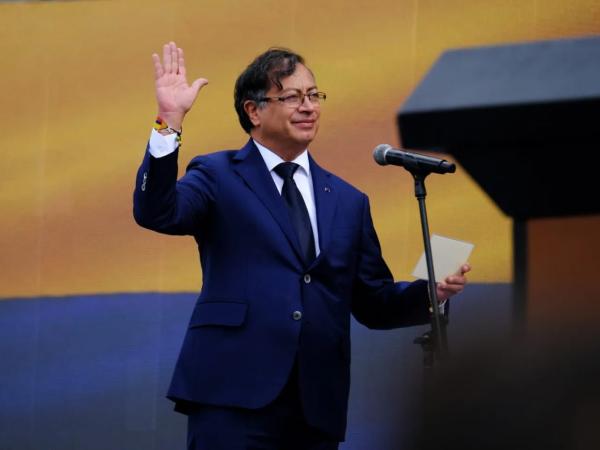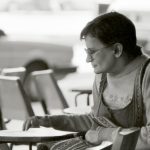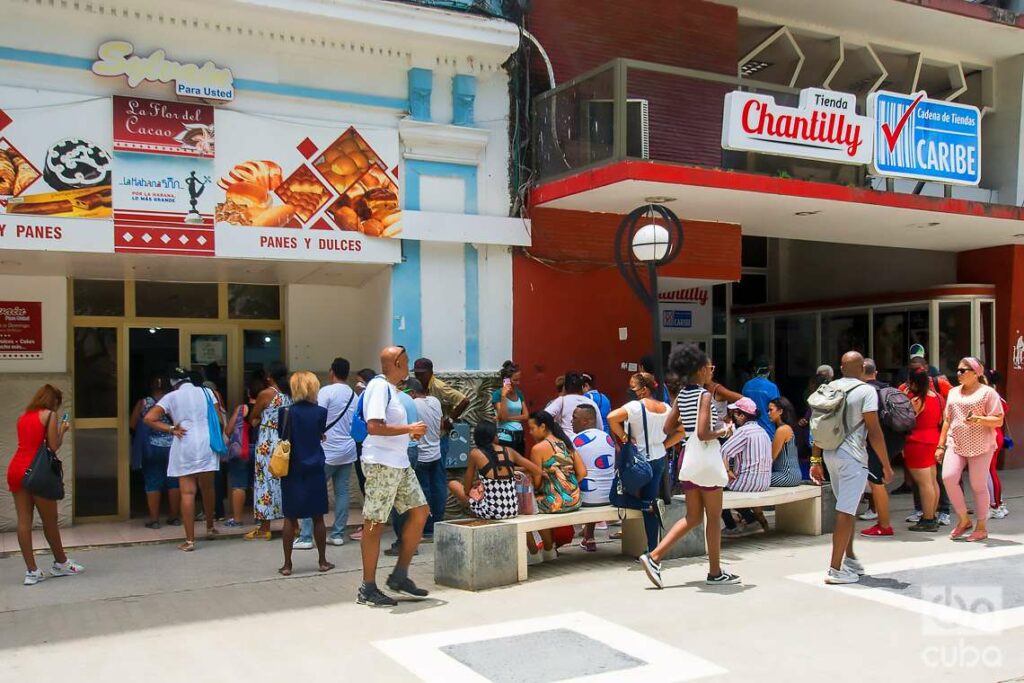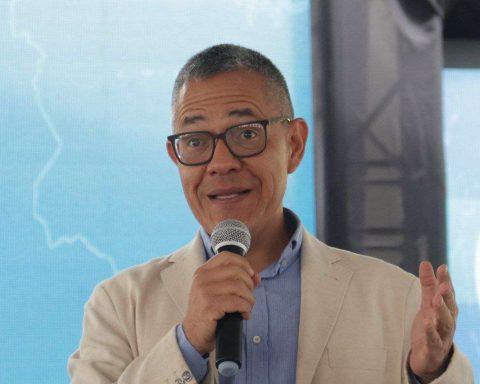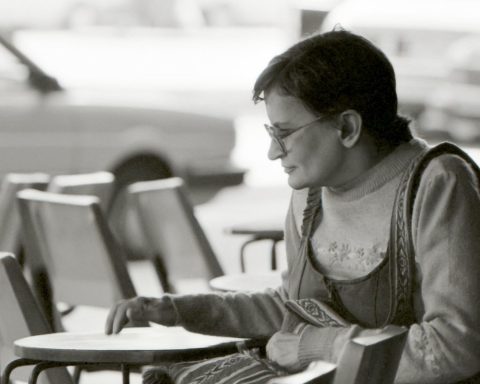Three months after taking office as president of Colombia, Gustavo Petro’s image of favorality falls, although it is still higher than the percentage of unfavorability.
(Petro asks to seek new economies for ‘the end of oil’).
This is indicated by two recent surveys carried out by Invamer and Country Pulse that show a drop in the approval of the president’s management, which in any case, exceeds the disapproval.
In the Pulso País survey, carried out for W Radio and released on October 20, the results regarding the approval of the president are at 48% and disapproval, at 38%. To the question that inquired about Petro’s image, 54% claimed to have a favorable and 35% unfavorable.
Regarding Vice President Francia Márquez, she has a favorable image of 64% compared to an unfavorable 28%.
(The collapse of the peso is due to the fact that they are ‘taking out dollars,’ says Petro).
Here are the answers to other questions the survey asked:
Do you understand the country model that President Gustavo Petro wants for Colombia?
Yes: 58%
No: 36%
Do you like Gustavo Petro’s style of government or not?
Yes: 49%
No: 41%
Do you approve or disapprove of how President Gustavo Petro is handling unemployment?
Approve: 41%
Disapprove: 44%
Do you approve or disapprove of how President Gustavo Petro is handling the Armed Forces?
Approve: 48%
Disapprove: 37%
Gustavo Petro
EFE
For his part, in the survey prepared by Invamer Poll, President Gustavo Petro suffered a setback in the qualification of his management.
The results of this poll show that his favorability fell from 56 to 46 percentage points, 10 points less than the August measurement.
Disapproval, meanwhile, went from 20 to 40 percentage points.
“This is an important fall because time is very short. The feeling of optimism that she managed to generate with his arrival at the Casa de Nariño could not be maintained in the first hundred days that will be fulfilled in November ”, said analyst Andrés Segura.
(President Gustavo Petro attacks the United States).
This, according to Invamer Poll, means that for Colombians the issue that most keeps them up at night is the economic issue. A concern that rose from 38% to 41%, precisely in these times when a tax reform that the president has vehemently defended is being discussed in Congress.
In fact, the survey asked: “Do you consider that the cost of living in Colombia is improving or getting worse?”
87% responded that it is getting worse, 7 percentage points more than in the measurement of the same firm two months ago. This contrasts with 6% who say it is improving.
“Do you consider that insecurity in Colombia is getting better or worse?” citizens were asked.
83% said getting worse. In August, when Petro took possession, the figure was 75%.
(‘We must not think about where we lay the blame’: ambassador to Petro).
When asked: “Do you consider that the Colombian economy is improving or getting worse?”, 80% said that it is getting worse; 12%, which is improving. At the previous measurement, 61% said it was getting worse versus 27% who thought it was getting better.
And in the environment, one of the issues on which the head of state insists the most, the numbers are also favorable:
“Do you consider that the environment in Colombia is improving or getting worse?” he asked himself:
66%, getting worse
24%, improving
“Do you think that corruption in Colombia is getting better or is it getting worse?”
66%, getting worse
19%, improving
“Do you consider that the handling of Venezuelan immigrants in Colombia is improving or worsening?”
65%, getting worse
26%, improving
“Do you think unemployment in Colombia is getting better or worse?”
62%, getting worse
21%, improving
“Do you consider that the fight against poverty in Colombia is improving or is it getting worse?”
59%, getting worse
26%, improving
“Do you consider that drug trafficking in Colombia is getting better or is it getting worse?”
58%, getting worse
16%, improving.

Gustavo Petro
Santiago Saldarriaga. TIME
Country Pulse technical sheet
Name of the research project: Pulse Country Colombia.
Legal entity that conducted the survey: Datexco Company SA OPINÓMETRO ®
Natural or legal person who entrusted it: La W radio.
Funding source: The W radio.
Target group: Men and women over 18 years of age in all socioeconomic levels, with coverage of municipal capitals in the regions of the scope of the study.
Collection technique: Personal survey through a telephone line to a fixed line telephone number in households. Supported in Computer Assisted Telephone Interview “CATI” system.
Population universe and geographic scope: Group of households with a fixed telephone line in the municipal capitals in the following departments of Colombia: Bogotá, DC, Atlántico, Bolívar, Cesar, Córdoba, La Guajira, Magdalena, Sucre, Antioquia, Caldas, Caquetá, Huila , Putumayo, Quindío, Risaralda, Tolima, Arauca, Boyacá, Casanare, Cundinamarca, Meta, Norte de Santander, Santander, Cauca, Chocó, Nariño and Valle del Cauca. Grouped into 5 regions as follows: Bogotá Region, Caribbean Region, Central Region, Eastern Region and Pacific Region.
Type of sample / sampling: Probabilistic, stratified and multistage sampling. Forced inclusion of 20 department capitals and 4 large municipalities that make up the metropolitan area of some of the capital cities; in total, 24 large municipalities were forcibly included. A group of 6 medium and small municipalities was also included to represent the rest of the Colombian territory. In the second stage it is a simple random sample of telephone series and then a random dialing to fixed lines.
Procedure used for the selection of sample units:
Random selection of telephone numbers on RDD (Random Digital Dialing) telephone series in the cities and regions of the scope of the study. Once the household has been contacted, the person of legal age who lives in the household closest to their birthday is inquired.
Sample Frame: Database of the telephone series of the cities selected within the regions of the scope of the study.
Sample size and distribution: A total of 900 effective surveys distributed according to the “Sample Distribution” were conducted.
Margin of error and reliability (Precision): A relative standard error margin of 3.3% is observed for the total estimation sample for proportions with an occurrence phenomenon greater than 50% and with a confidence level of 95%.
Quality Control: Criticism of 100% of the surveys carried out and supervision of 10% of the surveys carried out.
Topics of study, characters and entities for which it was inquired: Perception of the political and economic situation of the country. Perception of the government and its cabinet. Perception of characters, Institutions and entities and mayors. Likewise, the opinion on the peace process, corruption and other current issues.
Research objective: To investigate public opinion regarding different current national issues. Management and approval of the Government, Ministerial Cabinet, Entities, Characters and political and social positions on various issues.
Date of Data Collection: From October 4 to 14, 2022.
– COMPANY THAT CARRIED OUT THE SURVEY: INVAMER SAS
– NATURAL OR LEGAL PERSON WHO ORDERED IT: INVAMER SAS, for sale by subscription.
– FUNDING SOURCE: INVAMER SAS own resources
– OBJECTIVES: to measure the approval of the President and the favorability of personalities and institutions in Colombia. Know the public opinion on current events. Evaluate the opinion that people in general have of Colombia and of President Gustavo Petro Urrego. To measure the concept of people facing current Colombian problems. Observing the level of acceptance of the people with respect to laws, proposals or affirmations of the moment. Carry out a general evaluation in the main cities of the country on the work of the respective mayor and the way in which people are perceiving their city.
– UNIVERSE: men and women aged 18 or over, of all socio-economic levels, residing in: Bogotá (5,479,011), Medellín (1,813,155), Cali (1,374,126), Barranquilla (810,019) and Bucaramanga (390,351), for a total of 9,866,662 people, according to the 2018 Census.
– SAMPLE FRAME: cartography of cities to select people. The coverage of cartography in the 5 large cities is 95%. The number of blocks in the cartography are: Bogotá 39,103, Medellín 13,329, Cali 13,707, Barranquilla 7,783 and Bucaramanga 4,716 for a total of 78,638.
– SIZE AND DISTRIBUTION OF THE SAMPLE: 1,200 personal surveys distributed as follows: Bogotá 400 surveys, Medellín 200 surveys, Cali 200 surveys, Barranquilla 200 surveys and Bucaramanga 200 surveys. To adjust the total sample to the real size of the universe of each city, weighting factors are applied.
– SAMPLING SYSTEM: a probabilistic sampling was carried out by stages, first a systematic random selection of households was carried out and then a simple random selection of a person aged 18 or over.
– MARGIN OF ERROR: the margins of error within 95% confidence limits are: for the total sample of the 5 cities +/- 2.83%; for the total sample of Bogotá +/- 4.90%; for the totals of the samples of Medellin, Cali, Barranquilla and Bucaramanga +/-6.93%.
– DATA COLLECTION TECHNIQUE: personal surveys in the household of the respondents (CAPI).
– DATE OF DATA COLLECTION: from October 08 to 18, 2022.
– NUMBER OF INTERVIEWERS: 36.
– VALIDATION METHOD: 100% of the surveys carried out were reviewed and 15% of them were supervised.
– ISSUES REFERRED TO: public opinion on rulers, personalities, institutions and current events.
– PERSONS OR INSTITUTIONS FOR WHICH THE QUESTION WAS INQUIRED: refer to the questionnaire.
– SPECIFIC QUESTIONS ASKED: refer to the questionnaire.
– WEIGHTING FACTOR: It is the number that, acting as a multiplier, allows the sample data to be taken to the population, that is, to expand the sample.
The weighting factor was calculated by dividing the percentage of the universe of the variables age range and socioeconomic level over the percentage of the sample for the same variables. The weighting factor indicates the number of sample units that each respondent represents to be proportional or representative of the universe.
The universe used in this weighting factor was taken from the results of the 2018 National Population and Housing Census.
BRIEFCASE
